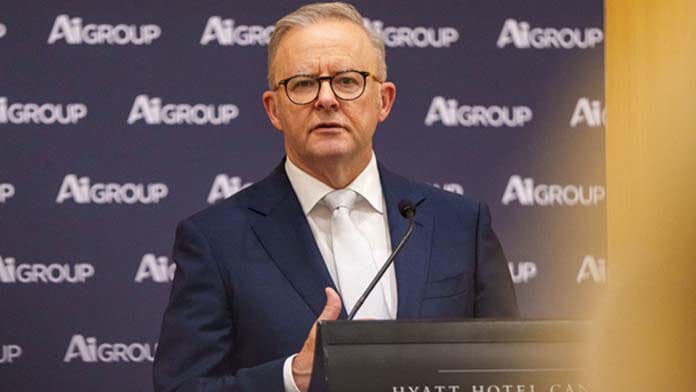Anthony Albanese and the Labor Party won a sweeping victory in May. The Liberals suffered a historic wipe-out and the Coalition between the Liberal and National parties is now in crisis.
This resounding victory should be a mandate to pursue ambitious policies that address the cost of living and the housing crisis, climate change and Indigenous rights.
But Albanese is offering nothing of the sort. After his election victory he told a press conference, “We’re not getting ahead of ourselves. I didn’t get ahead of myself in the last three years.”
Albanese is consciously aiming to govern from the centre. As he said following the election, he wants “Labor to be the natural party of government”—selling himself to Australia’s billionaires and business elite as a safe pair of hands.
This means abandoning any pretence of using his parliamentary majority to pursue real change, while arming Israel’s genocide in Gaza and continuing the union-busting crackdown on the CFMEU.
Liberal wipe-out
The extent of the Liberal Party wipe-out should not be underestimated. The fractured Coalition has been reduced to a rump of about 43 seats, its worst result in proportion to the number of seats in parliament since it was established in 1946.
The crisis is deeper than having lost seats. The Coalition lost whole demographics that will be essential to future elections. They have failed to appeal to diaspora communities reshaping once Liberal-held seats or to those under 45.
Pollster Kos Samaras points out that, “The Liberal and National parties now hold none of the country’s most diverse electorates and just four of the top 30 seats with the highest proportion of Gen Z and Millennial voters with a bachelor’s degree or higher. When it comes to the top 30 electorates with the largest Gen Z populations, they hold only three.”
The Coalition’s support among women has plummeted to levels lower than those under Scott Morrison.
The fracturing of the Coalition in the aftermath of the election has highlighted the right-wing policies that are electoral poison—like the Nationals’ support for nuclear power and continuing internal opposition to the net zero target for 2050 in both the Liberals and Nationals.
Despite the Liberals’ election of supposed moderate Sussan Ley as leader, the right dominates their parliamentary caucus. Her narrow victory in the leadership ballot will encourage further infighting.
As Paul Kelly from Murdoch’s Australian declared, “The Liberal Party is smashed—plunged into its worst ever crisis, its future in question.”
With the Coalition in crisis, big business can’t rely on its traditional political representatives. Another six years of Labor government looks almost certain.
But despite this, Labor under Albanese is making a pathetic offering of what he presents as ultra-cautious, status quo management. As he put it after the election, “We’re not getting carried away. We’ve been an orderly government.”
But this really means managing Australian capitalism in the interests of profits for the few. Albanese will not be using his massive parliamentary majority to unwind negative gearing and other incentives for speculation in housing that are pushing up prices and leaving millions in housing insecurity.
He won’t be loosening the straitjacket of anti-strike laws so workers can fight for wages that keep up with the cost of living. He won’t be taxing the rich to fund renewable energy and climate jobs.
Following the election his government has simply echoed business lobby talking points about the importance of productivity, all while continuing to attack the CFMEU and expanding fossil fuels by approving the extension of the North West Shelf gas development.
But Albanese’s failure to use his election win to deliver change is not simply a result of personal spinelessness.
Labor governments betray their working class supporters because this is part of running the system. Labor is a reformist party that aims to get elected and manage capitalism. This means keeping big business on side.
Albanese has consciously pursued close ties with major capitalist figures.
In 2022 an anonymous colleague told the Financial Review that Albanese, “Has been quietly building relationships with the big end of town for the past ten years.” This includes a close relationship with transport magnate Lindsay Fox and a friendship with former Qantas chief executive Alan Joyce, who carried out a ruthless campaign of job cuts.
With the Liberal Party shattered, the threat of a Liberal government can no longer be used to hose down demands for change. But Albanese has made it very clear that if workers want progress they are going to have to fight for it in the streets and workplaces.
By Adam Adelpour






